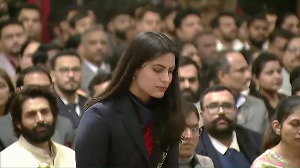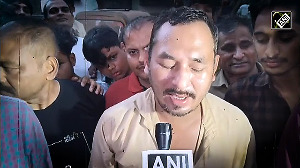'Will President Dissanayake calibrate his foreign policy taking into account India's immediate security concerns? We need to watch.'

"There are several ways how the Chinese capture the political elites in society, and the JVP is already inclined towards China. Therefore, I'm 100% certain that India is concerned," says Asanga Abeyagoonasekera author of Teardrop Diplomacy, China's Sri Lanka Foray, and three other books on Sri Lanka.
Abeyagoonasekera is a security, geopolitical analyst and strategic advisor from Sri Lanka. He is a senior fellow and executive director of the South Asia Foresight Network at the Millennium Project in Washington DC, and a technical advisor to the International Monetary Fund where he contributed to Sri Lanka's IMF Governance Diagnostic Report 2023.
In a phone interview with Rediff.com's Archana Masih from Washington, DC, Asanga Abeyagoonasekera discusses the Dissanayake-led JVP's Marxist ideological inclination towards China and what it means for India.
Part I of a multi-part interview:
Indian observers are wary of President Dissanayake's ideological origins and suspect he will lean more towards China than even the Rajapaksas.
Do you see this presidency becoming hostile towards India?
That is a factor that we will have to see in the months to come. Dissanayake comes from a Marxist-leaning party which means it has a close connection to China.
In the past, his party, the Janatha Vimukthi Peramuna, JVP, has stood against Indian policy. They took up arms against the Indo-Lanka Accord in 1988 because they saw it as a threat to the sovereignty of the country.
They have projected India as a huge threat in the past.
I hope he will navigate through these challenges because this is a different era and we are not in the 1980s any more. India's security concerns must be understood by this leadership.
The JVP maintains that it has taken a reformist turn and has moved away from the past. Anura Kumar has said that he would execute a balanced policy, but the concern is that during his campaign he spoke about cancelling a major Indian project, the Adani wind power project. That's not a good sign.
The JVP has concerns about transparency and the process that was followed to sign that agreement. We have highlighted in our report that the process can always be corrected rather than scrapping the project.
Previous regimes have also suspended and reinstated certain projects which have resulted in a loss for Sri Lanka.
In the past Sri Lanka has received political funding from countries which has come in the way of adopting a balanced foreign policy.
A good example was Gotabaya Rajapaksa'S statement that Sri Lankans need to move out of the existing market-oriented model, and move closer to a Chinese development model. I have highlighted this in my book that this is a danger point because it means moving away from liberal, democratic values.
There's a huge concern because of this past orientation.
For example, there's a moratorium on Chinese research vessels in Sri Lanka. Will Dissanayake continue with that, or not -- is to be seen. Will he calibrate his foreign policy taking into account India's immediate security concerns? We need to watch.

Does he want the Adani project to be cancelled because he wants to portray himself as the custodian of Sri Lankan national interest?
The JVP's stance towards such foreign projects comes from the Marxist ideology that we can do everything ourselves and don't need assistance. This is an inward looking approach.
The danger lies in Sri Lanka moving towards subsidisation and a closed economy like it was in the 1970s.
Some of their comments indicate a renegotiation on the IMF terms. Sri Lanka is not in a position to do these experiments.

Does India have to be concerned about the new president and his policies, especially towards China?
Of course, China is the main concern and it has been documented in many research reports as well.
How Dissanayake navigates China is going to be a concern for India because of India's own security interests.
Former presidents Gotabaya Rajapaksa and Maithripala Sirisena are clear indications of that failure. They followed a China-tilted policy towards the latter part of their presidencies. They started with India and ended with China -- that's what I say in my book Teardrop Diplomacy, China's Sri Lanka Foray.
There are several ways how the Chinese capture the political elites in society, and the JVP is already inclined towards China. Therefore, I'm 100% certain that India is concerned, but India probably is looking at the positive things, like their new reformist agenda and liberal values.
On hearing Dissanayake's comments about the cancellation of the Adani project, few of our researchers did see a pattern similar to the India Out campaign in Maldives and Bangladesh which started in a similar manner.
There is a possibility of such a campaign happening in Sri Lanka in the long run and we have to keep an eye out for that, but we'll be able to give a clear picture after the general election.
- Part 2 of the Interview: 'Cancelling Adani Project Not Good Sign'
Feature Presentation: Aslam Hunani/Rediff.com











 © 2025
© 2025